Don't wanna be here? Send us removal request.
Text


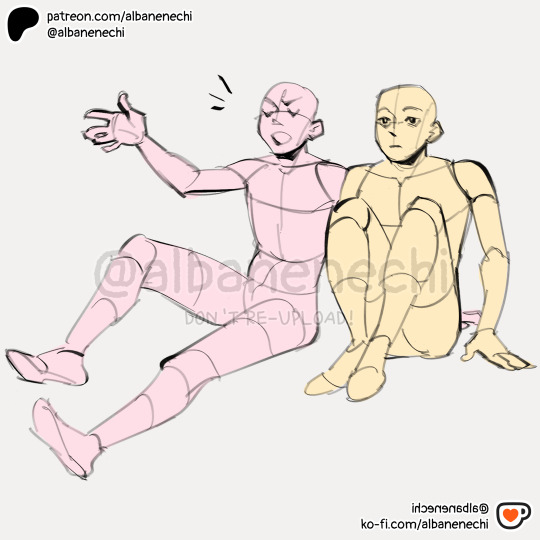
Drawing bases & pose references pt 66 🫶
3 extra drawings for patrons!
2K notes
·
View notes
Text
460 Adjectives
as reference for your next poem/story
BEHAVIOURAL ADJECTIVES
Affectionate - feeling or showing affection or warm regard; loving
Adoring - feeling or showing great affection and devotion
Affable - being pleasant and at ease in talking to others
Amorous - strongly moved by love; enamored
Caring - feeling or showing concern for or kindness to others
Devoted - characterized by loyalty and devotion
Loving - affectionate
Sweet - pleasing to the mind or feelings; agreeable, gratifying
Sympathetic - given to, marked by, or arising from sympathy, compassion, friendliness, and sensitivity to others' emotions
Tenderhearted - easily moved to love, pity, or sorrow; compassionate, impressionable
Agreeable - ready or willing to agree or consent; being in harmony
Courteous - marked by respect for and consideration of others
Decorous - marked by propriety and good taste; correct
Gallant - nobly chivalrous and often self-sacrificing
Gracious - marked by kindness and courtesy
Pleasant - having qualities that tend to give pleasure; agreeable
Polite - marked by an appearance of consideration, tact, deference, or courtesy
Respectful - marked by or showing respect or deference
Well-behaved - behaving in a polite or correct way
Well-mannered - having good manners; polite
Amiable - friendly, sociable, and congenial; generally agreeable
Affable - being pleasant and at ease in talking to others
Congenial - sociable, genial
Convivial - relating to, occupied with, or fond of feasting, drinking, and good company
Cordial - showing or marked by warm and often hearty friendliness, favor, or approval
Friendly - serving a beneficial or helpful purpose
Genial - marked by or freely expressing sympathy or friendliness
Hospitable - promising or suggesting generous and friendly welcome
Warm - marked by or readily showing affection, gratitude, cordiality, or sympathy
Welcoming - to greet hospitably and with courtesy or cordiality
Cheerful - full of good spirits; merry
Buoyant - cheerful, gay
Cheery - marked by cheerfulness or good spirits
Forward-looking - concerned with or planning for the future
Hopeful - full of hope; inclined to hope
Lighthearted - cheerfully optimistic and hopeful; easygoing
Optimistic - of, relating to, or characterized by optimism; feeling or showing hope for the future
Positive - marked by optimism
Sanguine - marked by eager hopefulness; confidently optimistic
Upbeat - cheerful, optimistic
Clever - mentally quick and resourceful
Astute - mentally sharp or clever
Bright - intelligent, clever
Brilliant - distinguished by unusual mental keenness or alertness
Intelligent - guided or directed by intellect; rational
Knowledgeable - having or showing knowledge or intelligence
Quick-witted - quick in perception and understanding
Sharp - keen in intellect; quick-witted
Smart - intelligent, bright; witty, clever
Wise - marked by deep understanding, keen discernment, and a capacity for sound judgment
Eloquent - marked by forceful and fluent expression
Articulate - expressing oneself readily, clearly, and effectively
Graceful - displaying grace in form or action
Influential - exerting or possessing influence (i.e., the act or power of producing an effect without apparent exertion of force or direct exercise of command)
Persuasive - tending to persuade (i.e., to plead with; urge)
Poised - marked by easy composure of manner or bearing
Refined - fastidious, cultivated
Silver-tongued - marked by convincing and eloquent expression
Smooth-tongued - ingratiating in speech; persuasive
Well-spoken - speaking well, fitly, or courteously
Good-natured - of a pleasant and cooperative disposition
Benevolent - marked by or disposed to doing good
Big-hearted - generous, charitable
Compassionate - having or showing compassion; sympathetic
Considerate - thoughtful of the rights and feelings of others
Good-hearted - having a kindly generous disposition
Helpful - of service or assistance; useful
Kind - of a sympathetic or helpful nature
Nice - polite, kind
Thoughtful - given to or chosen or made with heedful anticipation of the needs and wants of others
Patient - not hasty or impetuous; steadfast despite opposition, difficulty, or adversity
Accommodating - willing to please; helpful, obliging
Forbearing - to hold oneself back from especially with an effort
Forgiving - willing or able to forgive (i.e., pardon)
Long-suffering - patiently enduring lasting offense or hardship
Stoical - firmly restraining response to pain or distress
Tolerant - permitting or accepting something (such as a behavior or belief) that one does not like
Uncomplaining - not complaining; patient
Understanding - endowed with understanding; tolerant, sympathetic
Unexcitable - not responsive to stimuli
Reflective - marked by reflection; thoughtful, deliberative
Contemplative - marked by or given to contemplation (i.e., an act of considering with attention)
Insightful - exhibiting or characterized by insight (i.e., the act or result of apprehending the inner nature of things or of seeing intuitively)
Introspective - characterized by examination of one's own thoughts and feelings; thoughtfully reflective
Inward-looking - more interested in themselves than in other people or societies
Meditative - marked by or conducive to meditation (i.e., a discourse intended to express its author's reflections or to guide others in contemplation)
Pensive - musingly or dreamily thoughtful
Self-analyzing - relating to or using self-analysis (i.e., a systematic attempt by an individual to understand his or her own personality without the aid of another person)
Self-examining - a reflective examination (as of one's beliefs or motives); introspective
Self-observing - introspective
Sensible - having, containing, or indicative of good sense or reason
Analytical - skilled in or using analysis especially in thinking or reasoning
Cerebral - primarily intellectual in nature
Judicious - having, exercising, or characterized by sound judgment
Logical - capable of reasoning or of using reason in an orderly cogent fashion
Practical - actively engaged in some course of action or occupation
Pragmatic - relating to matters of fact or practical affairs often to the exclusion of intellectual or artistic matters; practical
Rational - relating to, based on, or agreeable to reason
Realistic - able to see things as they really are and to deal with them in a practical way
Reasonable - being in accordance with reason
Valiant - possessing or acting with bravery or boldness
Adventurous - disposed to seek adventure or to cope with the new and unknown
Bold - fearless before danger
Courageous - having or characterized by courage; brave
Dauntless - incapable of being intimidated or subdued
Fearless - free from fear
Gallant - spirited, brave
Heroic - exhibiting or marked by courage and daring
Plucky - spirited, brave
Valorous - valiant
Apprehensive - viewing the future with anxiety or alarm
Doubtful - marked by qualities that raise doubts about worth, honesty, or validity
Hesitant - slow to act or proceed (as from fear, indecision, or unwillingness)
Insecure - beset by fear and anxiety
Mistrustful - to be suspicious
Self-conscious - uncomfortably conscious of oneself as an object of the observation of others; ill at ease
Self-doubting - timid, diffident, insecure
Self-effacing - having or showing a tendency to make oneself modestly or shyly inconspicuous
Uncertain - not having certain knowledge; doubtful
Unconfident - lacking in confidence; unsure
Disillusioned - having lost faith or trust in something formerly regarded as good or valuable
Bleak - not hopeful or encouraging; depressing
Cynical - contemptuously distrustful of human nature and motives
Defeatist - an attitude of accepting, expecting, or being resigned to defeat
Downbeat - pessimistic, gloomy
Fatalistic - hacing a belief or attitude determined by a doctrine that events are fixed in advance so that human beings are powerless to change them
Hardened - callous
Negative - marked by features of hostility, withdrawal, or pessimism
Pessimistic - of, relating to, or characterized by pessimism; gloomy
Skeptical - relating to, characteristic of, or marked by skepticism (i.e., an attitude of doubt or a disposition to incredulity either in general or toward a particular object)
Dull - tedious, uninteresting
Bland - dull, insipid
Boring - causing weariness and restlessness through lack of interest
Charmless - unattractive or unpleasant
Stodgy - boring, dull
Tiresome - wearisome, tedious
Uncharismatic - lacking charisma (i.e., a special magnetic charm or appeal)
Unexciting - not exciting; dull, commonplace
Uninspiring - not having an animating or exalting effect
Uninteresting - not attracting interest or attention
Fierce - violently hostile or aggressive in temperament
Aggressive - marked by obtrusive energy and self-assertiveness
Antagonistic - showing dislike or opposition
Argumentative - having or showing a tendency to disagree or argue with other people in an angry way; disputatious
Bellicose - favoring or inclined to start quarrels or wars
Belligerent - inclined to or exhibiting assertiveness, hostility, or combativeness
Confrontational - clashing of forces or ideas; conflict
Defiant - full of or showing a disposition to challenge, resist, or fight; bold, impudent
Hostile - marked by malevolence; having or showing unfriendly feelings
Violent - emotionally agitated to the point of using harmful physical force
Impassive - giving no sign of feeling or emotion
Aloof - removed or distant either physically or emotionally
Apathetic - having or showing little or no interest, concern, or emotion
Cold - marked by a lack of the warmth of normal human emotion, friendliness, or compassion
Detached - exhibiting an aloof objectivity usually free from prejudice or self-interest
Dispassionate - not affected by personal or emotional involvement
Expressionless - lacking expression
Indifferent - marked by a lack of interest, enthusiasm, or concern for something
Stoic - not affected by or showing passion or feeling
Unemotional - not easily aroused or excited; cold
Lethargic - of, relating to, or characterized by laziness or lack of energy
Idle - not occupied or employed
Inactive - not active; sedentary
Indolent - averse to activity, effort, or movement; habitually lazy
Inert - very slow to move or act
Languid - sluggish in character or disposition; listless
Lazy - disinclined to activity or exertion; not energetic or vigorous
Slothful - inclined to sloth; indolent
Slow-moving - slow-footed, slowgoing
Sluggish - averse to activity or exertion; indolent; torpid
Mysterious - exciting wonder, curiosity, or surprise while baffling efforts to comprehend or identify; mystifying
Closemouthed - cautious in speaking; uncommunicative; also: secretive
Discreet - having or showing discernment or good judgment in conduct and especially in speech; prudent
Enigmatic - of, relating to, or resembling an enigma; mysterious
Evasive - tending or intended to evade; equivocal
Inscrutable - not readily investigated, interpreted, or understood; mysterious
Secretive - disposed to secrecy; not open or outgoing in speech, activity, or purposes
Taciturn - temperamentally disinclined to talk
Tight-lipped - reluctant to speak; taciturn
Uncommunicative - not disposed to talk or impart information; reserved
Odious - arousing or deserving hatred or repugnance; hateful
Abhorrent - causing or deserving strong dislike or hatred; being so repugnant as to stir up positive antagonism
Despicable - deserving to be despised; so worthless or obnoxious as to rouse moral indignation
Detestable - arousing or meriting intense dislike; abominable
Hateful - full of hate; malicious; deserving of or arousing hate
Horrible - extremely bad or unpleasant
Loathsome - giving rise to loathing; disgusting
Unkind - not pleasing or mild; inclement; harsh, cruel
Vicious - dangerously aggressive; savage
Vile - morally despicable or abhorrent
Presumptuous - overstepping due bounds (as of propriety or courtesy); taking liberties
Audacious - intrepidly daring; adventurous; recklessly bold
Bad-mannered - discourteous, disrespectful, ill-bred, impolite
Churlish - of, resembling, or characteristic of a churl; vulgar
Discourteous - lacking courtesy; rude
Disrespectful - to show or express disrespect or contempt for; insult, dis
Ill-mannered - having bad manners; rude
Impolite - not polite; rude
Impudent - marked by contemptuous or cocky boldness or disregard of others; insolent
Rude - offensive in manner or action; discourteous
Prickly - vexatious; easily irritated
Bad-tempered - easily annoyed or angered; surly, ill-tempered
Cantankerous - difficult or irritating to deal with
Crabby - easily irritated; peevish and irritable; grouchy
Curmudgeonly - (especially of an old person) bad-tempered and negative
Grouchy - given to grumbling; peevish
Ill-natured - having a bad disposition; cross, surly
Irritable - easily exasperated or excited
Sensitive - highly responsive or susceptible
Surly - irritably sullen and churlish in mood or manner; crabbed
Proud - having or displaying excessive self-esteem
Cocky - boldly or brashly self-confident
Conceited - having or showing an excessively high opinion of oneself
Haughty - blatantly and disdainfully proud; having or showing an attitude of superiority and contempt for people or things perceived to be inferior
Overbearing - harshly and haughtily arrogant
Overconfident - excessively or unjustifiably confident; having too much confidence (as in one's abilities or judgment)
Pompous - having or exhibiting self-importance; arrogant
Smug - highly self-satisfied
Snobbish - being, characteristic of, or befitting a snob (i.e., one who has an offensive air of superiority in matters of knowledge or taste)
Supercilious - coolly and patronizingly haughty
Silly - exhibiting or indicative of a lack of common sense or sound judgment
Brainless - devoid of intelligence
Dense - slow to understand
Foolish - having or showing a lack of good sense, judgment, or discretion
Idiotic - showing complete lack of thought or common sense
Ignorant - destitute of knowledge or education; unaware, uninformed
Mindless - marked by or displaying no use of the powers of the intellect
Slow-witted - mentally slow
Vapid - acking flavor, zest, interest, animation, or spirit; flat, dull
Witless - lacking wit or understanding; foolish
Talkative - given to talking
Babbling - idle, foolish, or nonsensical talk or chatter
Blathering - engaging in or characterized by foolish or nonsensical talk or writing
Chatty - fond of chatting; talkative
Conversational - given to conversation
Garrulous - given to prosy, rambling, or tedious loquacity; pointlessly or annoyingly talkative
Gossipy - characterized by, full of, or given to gossip (i.e., rumor or report of an intimate nature)
Loquacious - given to fluent or excessive talk; garrulous
Rambling - straying from subject to subject
Verbose - given to wordiness
Timid - lacking in courage or self-confidence
Bashful - socially shy or timid
Diffident - reserved, unassertive
Introverted - possessing a reserved or quiet nature typically with an inclination to solitude
Meek - deficient in spirit and courage; submissive
Reserved - restrained in words and actions
Reticent - inclined to be silent or uncommunicative in speech
Sheepish - meek, timid
Shy - easily frightened; timid
Withdrawn - socially detached and unresponsive
Tightfisted - reluctant to part with money
Avaricious - greedy of gain; excessively acquisitive especially in seeking to hoard riches
Close-fisted - unwilling to spend money; stingy
Miserly - marked by grasping meanness and penuriousness
Parsimonious - frugal to the point of stinginess; sparing
Penny-pinching - frugal
Penurious - given to or marked by extreme stinting frugality
Scroogelike - not generous with money; miserly
Stingy - not generous or liberal; sparing or scant in using, giving, or spending
Ungenerous - not generous; petty, mean; stingy
EMOTIONAL ADJECTIVES
Angry - feeling or showing anger (i.e., a strong feeling of displeasure and usually of antagonism)
Enraged - very angry; furious
Furious - exhibiting or goaded by anger
Incensed - very angry; enraged
Infuriated - furiously angry
Irate - roused to ire; arising from anger
Raging - causing great pain or distress
Seething - constantly moving or active; agitated
Upset - emotionally disturbed or agitated
Wrathful - filled with wrath; irate
Calm - free from agitation, excitement, or disturbance; still
Peaceful - untroubled by conflict, agitation, or commotion
Relaxed - easy of manner
Sedate - keeping a quiet steady attitude or pace; unruffled
Serene - marked by or suggestive of utter calm and unruffled repose or quietude
Tranquil - free from agitation of mind or spirit
Unbothered - not feeling or showing agitation, worry, or annoyance
Unflappable - marked by assurance and self-control
Unperturbed - not worried, upset, or disquieted
Untroubled - not given trouble; not made uneasy; calm
Cheerful - conducive to cheer; likely to dispel gloom or worry
Beaming - radiant; bright; smiling brightly; cheerful
Content - contented, satisfied
Gleeful - full of glee; merry
Happy - glad, pleased
Jocular - characterized by jesting; playful
Jovial - characterized by good-humored cheerfulness and conviviality; jolly
Joyful - experiencing, causing, or showing joy; happy
Merry - full of gaiety or high spirits; mirthful
Radiant - marked by or expressive of love, confidence, or happiness
Content - contented, satisfied
Appreciative - having or showing appreciation (i.e., a feeling or expression of admiration, approval, or gratitude)
Fulfilled - feeling happiness and satisfaction
Grateful - appreciative of benefits received
Gruntled - in good humor; happy, contented
Pleased - feeling or showing pleasure and satisfaction, especially at an event or a situation
Satisfied - pleased or content with what has been experienced or received
Thankful - well pleased; glad
Untroubled - not given trouble; not made uneasy
Unworried - not afflicted with mental distress or agitation
Disgruntled - unhappy and annoyed
Agitated - troubled in mind; disturbed and upset
Annoyed - feeling or showing angry irritation
Cross - marked by typically transitory bad temper
Distressed - of, relating to, or experiencing economic decline or difficulty
Exasperated - having or showing strong feelings of irritation or annoyance
Irritable - easily exasperated or excited
Resentful - full of resentment (i.e., a feeling of indignant displeasure or persistent ill will at something regarded as a wrong, insult, or injury)
Stressed - subjected to or affected by stress (i.e., bodily or mental tension)
Vexed - feeling or showing irritation, annoyance, or distress
Jealous - hostile toward a rival or one believed to enjoy an advantage
Begrudging - said, done, or given reluctantly; grudging
Bitter - exhibiting intense animosity
Covetous - marked by inordinate desire for wealth or possessions or for another's possessions
Desirous - impelled or governed by desire (i.e., conscious impulse toward something that promises enjoyment or satisfaction in its attainment)
Envious - feeling or showing envy
Grudging - unwilling, reluctant
Malicious - having or showing a desire to cause harm to someone; given to, marked by, or arising from malice (i.e., desire to cause pain, injury, or distress to another)
Resentful - caused or marked by resentment (i.e., a feeling of indignant displeasure or persistent ill will at something regarded as a wrong, insult, or injury)
Spiteful - filled with or showing spite; malicious
Lively - briskly alert and energetic; vigorous, animated
Animated - full of vigor and spirit; lively
Elated - marked by high spirits; exultant
Electrified - to excite intensely or suddenly
Energetic - operating with or marked by vigor or effect
Enthusiastic - filled with or marked by enthusiasm (i.e., strong excitement of feeling)
Excited - having, showing, or characterized by a heightened state of energy, enthusiasm, eagerness, etc.
Exhilarated - very happy and excited or elated
Spirited - full of energy, animation, or courage
Thrilled - extremely pleased and excited
Unhappy - not cheerful or glad; sad, wretched
Crestfallen - feeling shame or humiliation; dejected
Dejected - low in spirits; depressed
Gloomy - low in spirits; melancholy
Glum - broodingly morose
Grief-stricken - very sad; deeply affected by grief
Melancholic - of, relating to, or subject to melancholy; depressed
Miserable - being in a pitiable state of distress or unhappiness
Sad - affected with or expressive of grief or unhappiness; downcast
Sorrowful - expressive of or inducing sorrow (i.e., resultant unhappy or unpleasant state)
PHYSICAL ADJECTIVES
Aged - grown old
Ancient - having had an existence of many years; venerable
Centenarian - one that is 100 years old or older
Elderly - of, relating to, or characteristic of later life or elderly persons
Gray-haired - having gray hair; of or relating to old age or old people
Mature - of, relating to, or being an older adult; elderly
Nonagenarian - a person whose age is in the nineties
Old - advanced in years or age
Senior - a person older than another; of, relating to, or intended for seniors
Wrinkled - to become marked with or contracted into wrinkles
Attractive - arousing interest or pleasure; charming
Beautiful - having qualities of beauty; exciting aesthetic pleasure
Dashing - marked by vigorous action; spirited
Fetching - attractive, appealing
Good-looking - having a pleasing or attractive appearance
Gorgeous - splendidly or showily brilliant or magnificent
Handsome - having a pleasing and usually impressive or dignified appearance
Pretty - having conventionally accepted elements of beauty
Striking - attracting attention or notice through unusual or conspicuous qualities
Stunning - strikingly impressive especially in beauty or excellence
Average - not out of the ordinary; common
Forgettable - fit or likely to be forgotten
Homely - plain or unattractive in appearance
Mediocre - of moderate or low quality, value, ability, or performance
Ordinary-looking - not different or special or unexpected in any way; usual
Plain - lacking ornament; undecorated
Plain-featured - ordinary
Plain-looking - not beautiful, distinctive, or remarkable in appearance; normal
Unexceptional - not out of the ordinary; commonplace
Unremarkable - unworthy or unlikely to be noticed; not remarkable; common, ordinary
Feeble - markedly lacking in strength
Decrepit - wasted and weakened by or as if by the infirmities of old age
Delicate - not robust in health or constitution; weak, sickly
Doddering - showing or involving a loss of physical or cognitive abilities in old age
Frail - easily broken or destroyed; fragile; physically weak
Infirm - of poor or deteriorated vitality, especially: feeble from age
Sickly - somewhat unwell, also : habitually ailing
Unwell - being in poor health; ailing, sick
Wan - suggestive of poor health; sickly, pallid
Weak - lacking strength
Muscular - of or relating to physical strength; full-bodied
Athletic - vigorous, active
Brawny - muscular, also: strong, powerful
Burly - strongly and heavily built
Fit - sound physically and mentally
Herculean - of extraordinary power, extent, intensity, or difficulty
Powerful - having great power, prestige, or influence
Robust - having or exhibiting strength or vigorous health
Strong - having or marked by great physical power
Sturdy - firmly built or constituted
Short - having little length; not tall or high
Diminutive - exceptionally or notably small
Little - not big
Petite - having a small trim figure
Pint-sized - small
Short-legged - having short legs, particularly in proportion to one's body
Small - having comparatively little size or slight dimensions
Stubby - being short and thick
Teeny - tiny
Tiny - very small or diminutive; minute
Sophisticated - deprived of native or original simplicity
Chic - cleverly stylish; smart
Dapper - neat and trim in appearance
Dignified - showing or expressing dignity (i.e., formal reserve or seriousness of manner, appearance, or language)
Elegant - of a high grade or quality; splendid
Majestic - having or exhibiting majesty; stately
Noble - possessing outstanding qualities; illustrious
Regal - of notable excellence or magnificence; splendid
Stately - marked by lofty or imposing dignity; haughty
Stylish - conforming to current fashion
Stout - bulky in body
Big - large or great in dimensions, bulk, or extent
Chubby - somewhat fat; having a full, rounded form
Heavy - having great weight
Large - exceeding most other things of like kind especially in quantity or size
Overweight - exceeding expected, normal, or proper weight
Plump - having a full rounded usually pleasing form
Plus-size - extra large
Portly - heavy or rotund of body; stout
Potbellied - having a potbelly (i.e., an enlarged, swollen, or protruding abdomen)
Tall - high in stature
Colossal - of, relating to, or resembling a colossus (i.e., a person or thing of immense size or power)
Gangling - tall, thin, and awkwardly built; lanky, gangly
Giant - having extremely large size, proportion, or power
Gigantic - exceeding the usual or expected (as in size, force, or prominence)
Long-legged - having long legs
Massive - forming or consisting of a large mass; bulky; weighty
Monstrous - having extraordinary often overwhelming size
Statuesque - having a tall and shapely form
Towering - impressively high or great; imposing
Thin - not well fleshed; lean
Angular - lean and having prominent bone structure
Bony - having prominent bones
Lean - lacking or deficient in flesh
Scrawny - exceptionally thin and slight or meager in body or size
Skinny - lacking usual or desirable bulk, quantity, qualities, or significance
Slender - spare in frame or flesh, especially: gracefully slight
Slim - of small diameter or thickness in proportion to the height or length; slender
Underweight - weighing less than the normal or requisite amount
Willowy - pliant; gracefully tall and slender
Unattractive - not attractive; plain, dull
Ugly - offensive to the sight; hideous
Displeasing - to incur the disapproval or dislike of especially by annoying; to give displeasure
Hideous - offensive to the senses and especially to sight; exceedingly ugly
Ghastly - terrifyingly horrible to the senses; frightening
Repulsive - tending to repel or reject; cold, forbidding; arousing aversion or disgust
Unpleasant - not pleasant; not amiable or agreeable; displeasing
Grotesque - fanciful, bizarre; absurdly incongruous; departing markedly from the natural, the expected, or the typical
Revolting - extremely offensive
Unsightly - not pleasing to the sight; not comely
Young - being in the first or an early stage of life, growth, or development
Adolescent - of, relating to, or being in adolescence; emotionally or intellectually immature
Boyish - of, like, or characteristic of a male child or young man
Childlike - resembling, suggesting, or appropriate to a child or childhood, especially: marked by innocence, trust, and ingenuousness
Girlish - of, relating to, or having the characteristics of a girl or girlhood
Juvenile - reflecting psychological or intellectual immaturity; childish
Immature - exhibiting less than an expected degree of maturity
Teenaged - of, being, relating to, or intended for teenagers (i,e., someone who is between 13 and 19 years old)
Underage - of less than mature or legal age
Youthful - having the vitality or freshness of youth; vigorous
Sources: 1 2 3 4 5 ⚜ More: Notes & References ⚜ Writing Resources PDFs +600 Traits ⚜ 170 Quirks ⚜ 200+ Character Quirks ⚜ Types of Adjectives
592 notes
·
View notes
Text
One thing I really like about RWBY as a show is that the heroes do not have a strict no kill rule. Like, obviously, they very much prefer not hurting or killing anyone at all, but if it comes to that, they do not hesitate.
-Tyrian is trying to capture Ruby and kill her uncle and her friends? The moment he gets slightly distracted, Ruby takes the chance and cuts his tail off without a second thought.
-Cinder is affected by Ruby's silver eyes in the Battle of Haven? Jaune doesn't hesitate and the moment she lets her guard down he tries to stab her in the face; had he gone for a slash instead, Cinder would be dead.
-Tock has blinded Maria and is about to kill her? There you go, Maria will decapitate her. Bye, Tock.
-Adam keeps trying to kill Blake and Yang? Oh, he gets stabbed by both of them. No more Adam.
-Ironwood tries to shoot Winter again with that weird gun even though she's a Maiden now? Winter just sends the blast back at him and leaves. Doesn't even check if he's still alive.
-Neo just pushed Yang to the void and they think she's gone? Blake WILL try to cut Neo's head off. And while they're fighting Ruby doesn't hesitate to push Neo off the bridges even if she thought that would kill her.
Which are all like, normal. Those other people are actively trying to kill them or their loved ones as well. Which is why I used to be really confused when I kept seeing some people complaining mostly about the Ruby with Tyrian and the Blake and Yang vs Adam things. Saying they are supposed to be the good guys and they should set an example to viewers instead of maiming or killing their foes.
What example do you want them to set? That letting others kill you and your loved ones is okay? Because that's what was gonna happen; Tyrian had just poisoned Qrow, actually he's lucky Ruby only went for the tail. Adam was not going to stop and he going to take Blake's sword to continue to try murdering her and Yang, who had no Auras either and were as vulnerable as he was. They either did it first or they could die, and they did. It's self-defense. Tyrian and Adam were trying to kill them and they were the ones who started the fights. You fuck around, you're gonna find out.
1K notes
·
View notes
Text
rule #1 of being a child soldier is to have fun and be yourself
27K notes
·
View notes
Text

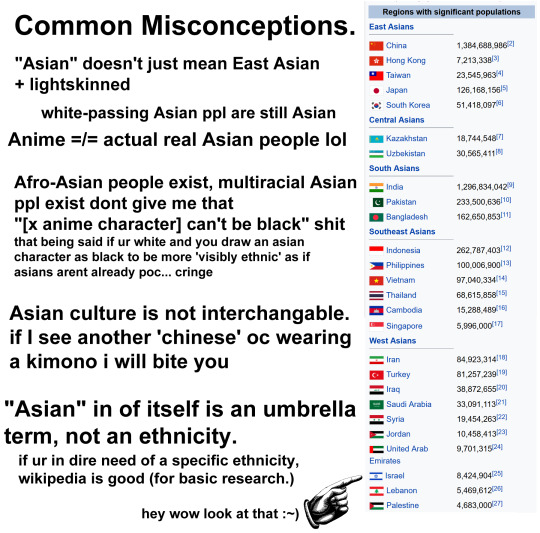
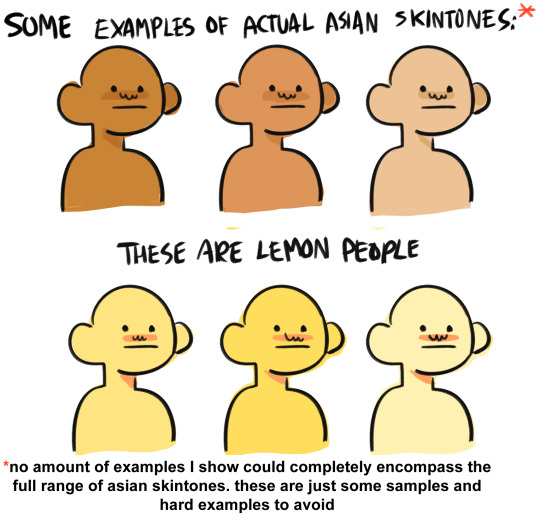
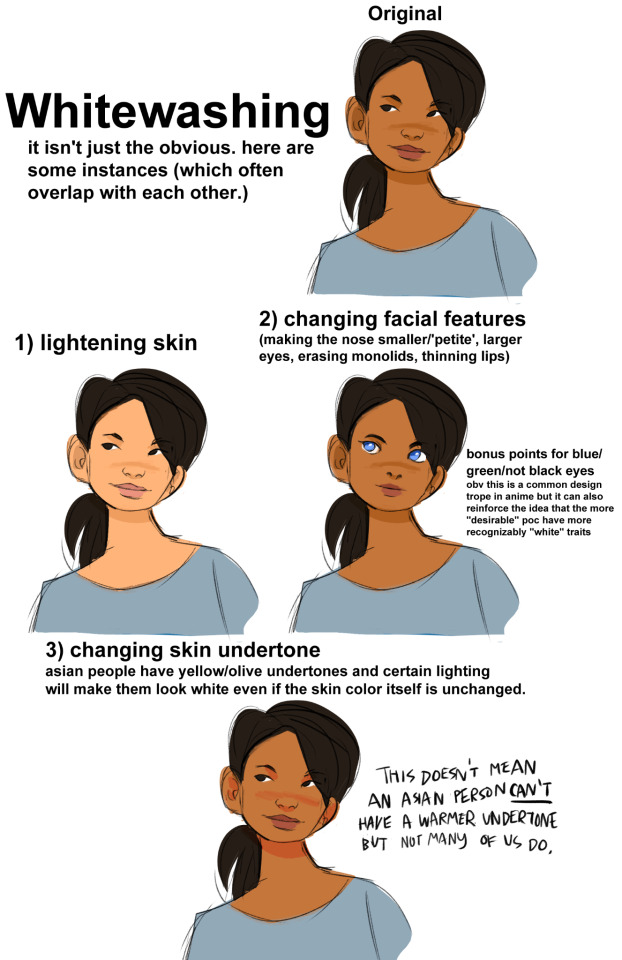

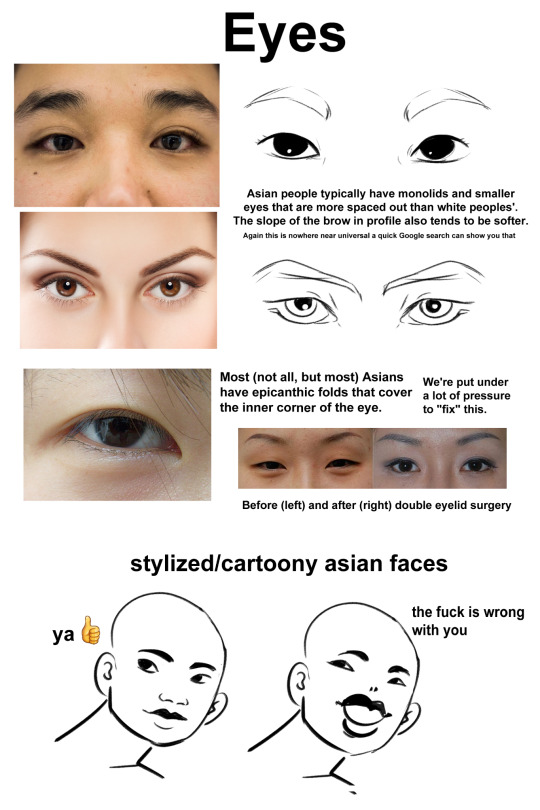
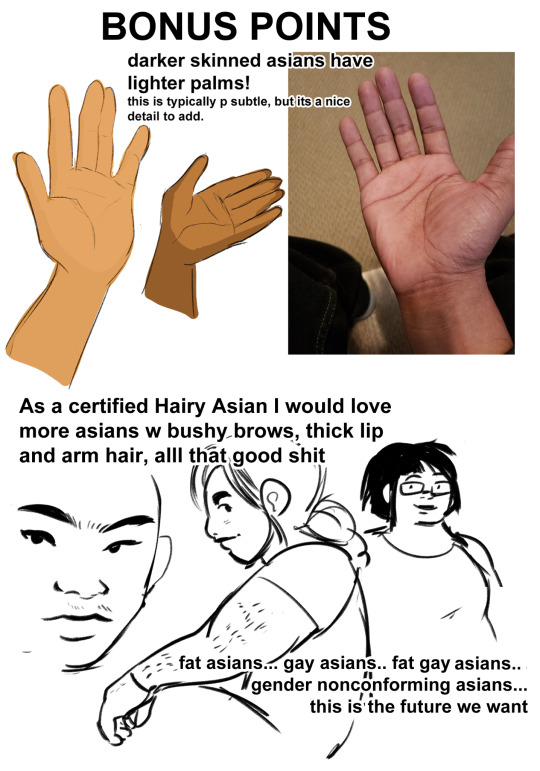
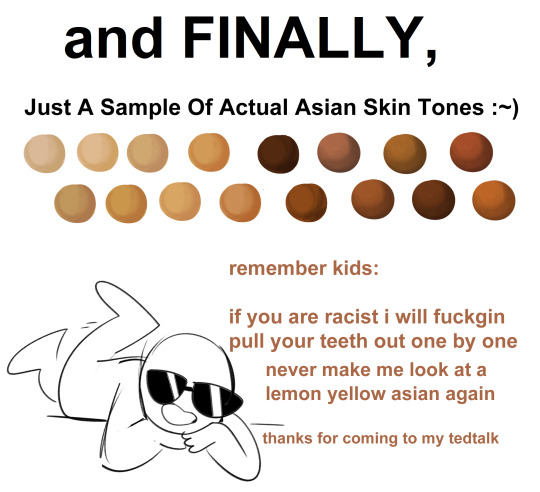
disclaimer: I am east asian. if anyone who is not white sees anything wrong with my phrasing, inaccuracies, or insensitivity, or something I missed, please feel free to add on. I'm just one person with one perspective; none of what I say should be taken as The Singular way to draw an Asian character. if you havent done so already, please take the effort to expand your view of Asian culture outside this one tutorial.
if a white person reblogs this and adds something stupid I'm going to bite and kick you like a wild animal
156K notes
·
View notes
Text
My biggest tip for fanfic writers is this: if you get a character's mannerisms and speech pattern down, you can make them do pretty much whatever you want and it'll feel in character.
Logic: Characters, just like real people, are mallable. There is typically very little that's so truly, heinously out of character that you absolutely cannot make it work under any circumstance. In addition, most fans are also willing to accept characterization stretches if it makes the fic work. Yeah, we all know the villain and the hero wouldn't cuddle for warmth in canon. But if they did do that, how would they do it?
What counts is often not so much 'would the character do this?' and more 'if the character did do this, how would they do it?' If you get 'how' part right, your readers will probably be willing to buy the rest, because it will still feel like their favourite character. But if it doesn't feel like the character anymore, why are they even reading the fic?
Worry less about whether a character would do something, and more about how they'd sound while doing it.
44K notes
·
View notes
Text
10 Ways to Ensure Your Villain's Evil Monologuing Dialogue is as Unsettling as Possible!

1.) Make sure you're mixing body language with the words themselves: You can have your villain saying the most twisted shit, but if they're just standing there like a cardboard cutout, their words probably aren't going to hit as hard. Have them touch your protag. Have them toy with a weapon as if they're going to use it. Have them pace. Have them put together the blood ritual they're ranting about. Keep them moving.
2.) Have them use personal knowledge as a tool: Does your villain have some deep dark dirt on your protag? Don't let that all go in one swoop. Let them hint at it in drops before they open the dam. Maybe they use that knowledge as a bargaining tool to get an upper hand, or use it to send the trapped protag into a frenzy because they love to watch them scream.
3.) When it comes to threats, certainty is key: A threat is a threat, but there's nothing like a threat being spoken as if the villain knows it's going to happen. Whether your villain has already caught your protag, or is in the process of doing so, everything they say they want to see happen to your protag needs to come with absolute certainty. Almost as if it's a certain warning, and not just something they’re saying to be scary.
4.) Contradictions are your friend: Nothing indicates a warped villainous mind more than some juicy contradictions. Your villain might be talking about how they're going to flay your protag's hide after catching them in their dungeon, only to throw in a subtle "but, you're probably safer here with me." Find ways to toss in twisted contradictions that also underline the crazy shit they might be saying.
5.) Mess with syntax: Unsettling dialogue calls for unsettling structure. Incomplete sentences, unforeseen pauses, longwinded explanations broken up by more unforeseen pauses. Whatever it is, keep the rhythm offbeat. Don't give your reader a chance to be able to tell what's coming.
6.) Expectations? Subvert those: Your protag and even your readers might be suspecting one thing from your villain, so throw them a curveball and hit them with the complete opposite. Perhaps you've reached a point in your story where it seems like the villain might kill your protag on sight. But no, have your villain mention exactly why they aren't going to do that, and why they want to wait it out.
7.) Mix quiet confidence and loud assertion: Some might say that the silent seether is scarier, while others might agree that the sudden explosive type takes the bigger unsettling prize. In my opinion, you can really capitalize on the eeriness of villain dialogue by tapping into both. A villain that speaks on with refined confidence before very suddenly exploding, without much warning, can really power up the dread behind their words.
8.) Sometimes, ambiguity is better than being straightforward: Whether it's obvious that your villain has a lot of tricks up their sleeves--or not--leaving things to the imaginations of your protag, and subsequently, your readers is great for building dread. You can use dialogue to make it clear that they're up to something, but never make them fully disclose what that is. They might show it instead of tell it, or it might just never happen. Either way, it'll likely have everyone looking over their shoulders.
9.) There might be times where silence says everything: You might be worried about penning the correct verbiage for your villain's big evil speech, but sometimes, silence speaks wonders. When used correctly, a long pause, or a bout of silence after your protag has said their piece can build a sense of uneasiness more than them actually speaking would have.
10.) Find ways for your villain to mirror the hero: A monologuing villain is better when they're throwing your hero's values and beliefs back in their face. A hero that believes in mercy? Well, have your villain talk about how they'll make them beg for it. A hero that believes in the greater good? Have your villain talk about their idea of a greater good.
As always, GO WRITE SOMETHING TODAY! <3
2K notes
·
View notes
Text
Represention of Autistic Frustration in Laios Dungeon Meshi
Like many other autistic people, I related strongly to Laios Touden while reading Dungeon Meshi. This post isn't going to spend time disputing whether he displays autistic traits or not—while I could do that, I want to focus on why specifically his portrayal struck a chord with me in a way the writing of most other autistic-coded characters has not.
Disclaimer: as the above suggests, this post is strongly informed by my own experiences as an autistic person, as well as the experiences of my neurodivergent friends with whom I have spoken about this subject. I want to clarify that in no way am I asserting my personal experience to be some Universal Autistic Experience. This post is about why Laios' character feels distinct and significant to me in regard to autistic representation, and while I'm at it, I do feel that I have interesting things to say about autistic representation in media generally. This also got a bit long, so I'm sticking it under a read more. Spoilers for up to the end of chapter 88 below.
The thing that stands out most to me in regard to Laios' characterisation is the open anger he displays when someone points out his inability to read other people. This comes up prominently in his interactions with "Shuro" (Toshiro Nakamoto):
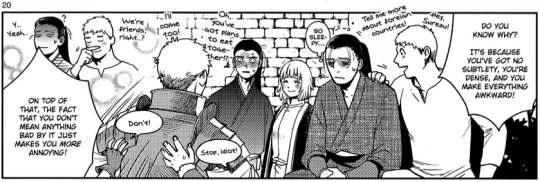
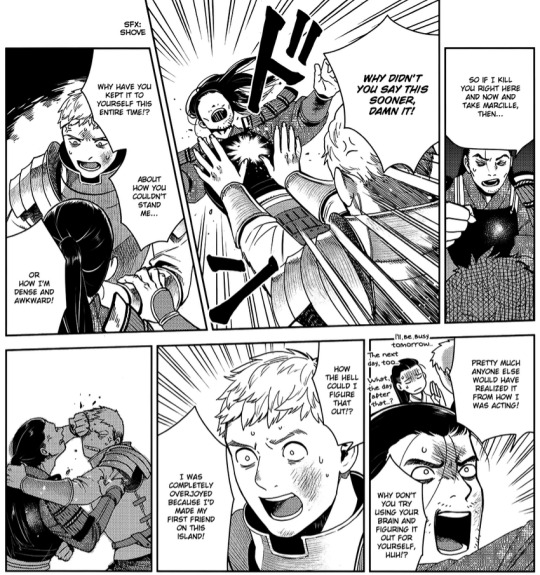
The frustration pictured above (Laios continuing to physically tussle with Toshiro, using crude language toward him) becomes even more notable when you remember that this is Laios, who, outside of these interactions, is not easily fazed and often exists as a lighthearted contrast to the rest of the cast. Then we get to Laios' nightmare.
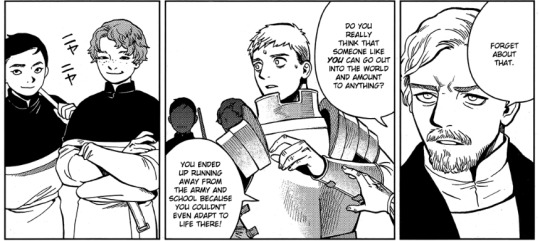

In Falin's words: "Nightmares love emotional wounds. Wounds you hold in your heart. Things that give you stress, or things that were traumatic for you. They aggravate memories like that and cause the dreamer to have terrible dreams." (chapter 42, page 10.) (damn. i'm properly citing for this post and everything.)
Thus, Laios' nightmare establishes an important fact: even if he is unable to recognise social blunders while he's making them, he's at least subconsciously aware that other people operate on a different wavelength to him, and that he's an outsider in many of his social circles (both past and present). His dream-father's disparaging words stress the impact this has had upon his ability to live up to the expectations set out for him, and we also get a panel of kids who smirk at him (presumably former bullies to some degree). Toshiro's appearance only hammers home how much Laios is still both humiliated and angered by his misunderstanding of their relationship.
I've thought a lot about anger as concomitant to the autistic experience. When autistic representation portrays ostracization, it's generally from an angle of the autistic character being upset at how conforming to neurotypical norms doesn't come easily to them; as a result, they express a desire to 'get better' at meeting neurotypical standards, a desire to become more 'normal' (whether the writing implies this is a good thing or not). In contrast, not once does Laios go, "I need to perform better in my social interactions, and try to care less about monsters, because that's what other people find weird." His frustration is directed outward rather than inward, and as a result, it's the people around him who are framed as nonsensical.
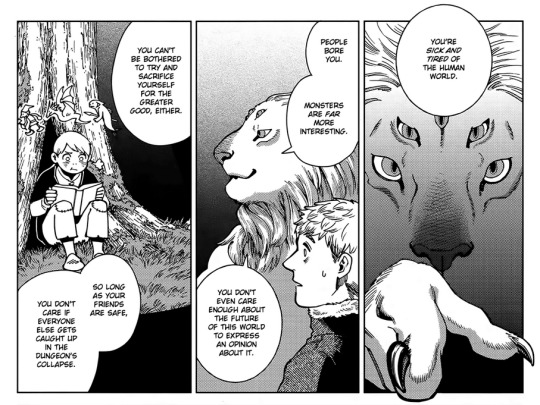
The Winged Lion starts delineating Laios' anger, and Laios' reaction is to think to himself, "It can sense all my thoughts, huh?" (chapter 88, page 16.) This is the scene that really resonated with me. I'm not saying I have never felt the desire to conform to neurotypical norms that is borne from insecurity, but primarily, I know that I don't want to work toward becoming 'normal'—I don't want to change myself for people who follow rules I find nonsensical. It's the difference between, "Oh god, why can't I get it," and, "WHY CAN'T YOU GET IT?" (phrasing here courtesy of my friend Miles @dogwoodbite). And for me personally, Dungeon Meshi is the first time I've seen this frustration and the resultant voluntary isolation from other people portrayed in media so candidly. Laios' anger is not downplayed or written to be easily palatable, either.
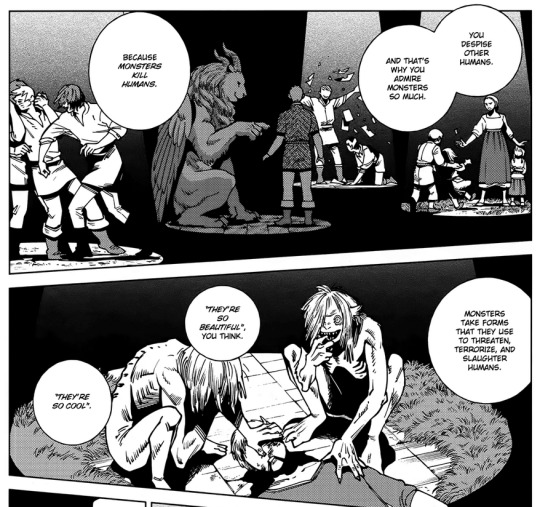
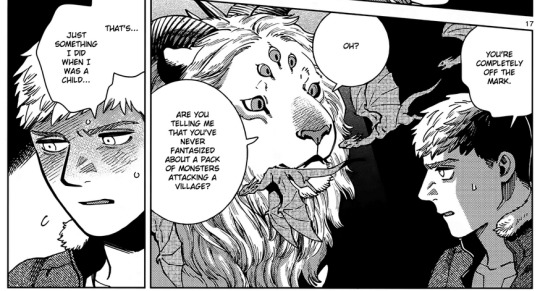
The culmination of Laios' frustrations in this scene wherein we learn that Laios has fantasised about "a pack of monsters attacking a village" drives home just how alienated he really feels. I need not go into his wish to become a monster himself, redolent of how many autistic people identify/have identified with non-humans to some degree as a result of a percieved disconnect from society (when I was younger, I wanted to be a robot. I still kind of do.)
Obviously, wishing death upon other people is a weighty thing, but the unfiltered nature of this page is what deeply resonated with me. The Winged Lion is laying Laios' deepest and most transgressive desires bare, and they are desires that are a product of lifelong ostracization by others (whether intentional or unintentional). This is the brand of anger I'm familiar with, and that my neurodivergent friends express being familiar with, but that I haven't seen portrayed in writing so explicitly before—in fact, it surprised me because most well-meaning autistic representation I've experienced veers toward infantilisation in trying make the autistic character's struggles easy for neurotypicals to sympathise with.
Let's also not neglect the symbolism inherent to Laios' daydream. "A pack of monsters attacking a village". Functionally, monsters are Laios' special interest—he percieves everything first and foremost through his passion for monsters. His daydream of monsters attacking—killing—humans, is fundamentally a daydream of the world he understands (monsters) overthrowing the world that is so illogical to him, that has repeatedly shunned him (other people). I joked to my friends that it's an autistic power fantasy, and it actually sort of is. And in it, his identity is aligned with that of the monsters, while his anger manifests in a palpable dissociation from the rest of humanity. This is one manga page. It's brief. It's also very, very raw to me. I think about it often.
To conclude, I love Laios Dungeon Meshi. This portrayal of open frustration in an autistic character meant a lot to me, and I hope I've sufficiently outlined why. Also, feel free to recommend media with autistic representation in the notes if you've read this far—I would really like to see if there is more of this nature. Thank you for reading. I'm very tired and should probably sleep now.
10K notes
·
View notes
Text
Okay you know what? Schizophrenia is way too demonized and, as someone who has had it for ten freaking years, I want to dispel some myths about hallucinations.
Aka talking about hallucinations using my own personal examples because I had an actual fucking THERAPIST tell me I was the ONLY person in the world who experienced hallucinations that were not solely visual or auditory. Warning for…hallucinations obviously.
Visual hallucinations - These are hallucinations you see. I usually experience these by way of inanimate objects moving (like dolls or mannequins moving on their own, before you ask yes I do hate clothing stores). Sometimes these can be scary and sometimes they’re mundane! I’ve hallucinated monsters and I’ve hallucinated pretty birds. Hallucinations don’t always have to be scary.
Auditory hallucinations - These are hallucinations you hear. I commonly hear crying, talking, music, and video game noises. If I play a video game for too long and it has a repetitive sound in it, I WILL be hearing that sound for minimum three hours. You think the sound that plays in LoZ when you’re low on hearts is annoying? Try having to listen to it on loop when you’re not even playing the game. Like with visual hallucinations, they’re not always scary! Contrary to popular belief, they can be totally mundane. Hearing voices is not always scary either. Sometimes they just say random stuff, sometimes they give me little pep talks, most of the time they just all talk over each other at once and I’m like GUYS ONE AT A TIME PLEASE jeezy cheez-it’s.
Tactile hallucinations - These are hallucinations you feel. I hear common tactile hallucinations are feelings of bugs on you and fur but I don’t usually have these, I mostly have tactile hallucinations of being choked which is…not fun.
Olfactory hallucinations - These are hallucinations you smell. Yeah I thought of farts first too. So far I haven’t heard of that being a common hallucination though. I hear a common olfactory hallucination is burning? But I just smell wet metal. I…don’t know why.
Gustatory hallucinations - These are hallucinations you taste. I don’t know how to pronounce gustatory either. I often taste blood or metal. I hear those are pretty common gustatory hallucinations.
None of these hallucinations are inherently scary! As a child, I thought hallucinations were a super power. After living with them for over ten years, they just don’t phase me that much. Remember: you don’t have to be schizophrenic to experience hallucinations! There are many things that cause hallucinations including and not limited to trauma, PTSD, psychotic depression, etc. (sometimes even stress!)
But please please please be kind to people who hallucinate. I’ve lived with it for over ten years and (rarely) it can still be terrifying to me sometimes. People say “But there’s nothing there and you know that-“ yes I know that! But it’s still very very real to me and very terrifying! Minimizing what people experience with their hallucinations is not helpful and will only make them feel worse.
Thank you for reading!
54K notes
·
View notes
Text
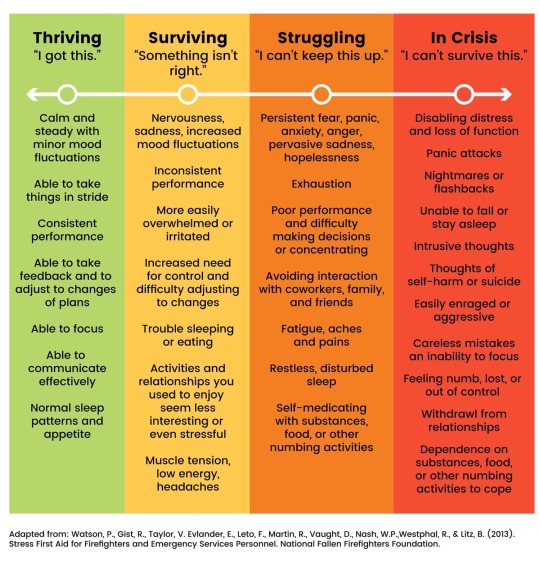
saw this on twitter and wanted to save it here
71K notes
·
View notes
Text
i love characters who are always like fear not, i shall take care of this problem for you….. by sacrificing myself!! and everyone else is like i swear to god if you pull this shit again i’ll kill you
41K notes
·
View notes
Text
“My story has so much gay rep in it!” Awesome. How are you treating your female characters btw
90K notes
·
View notes
Text
i think 'I trust you with my life but not your own' as a trope is one of the ones that can always fuck me up no matter what
71K notes
·
View notes
Text

Hello!
My name is moukies (she/her), and I am a queer/trans Black editor who specializes in sensitivity readings and cultural consultations. Pleased to e-meet you! :)
I am looking to build my roster of clients, and have created my own service, moukies editing, with the express intent of promoting my skillset and establishing myself as a freelance editor.
If you don't know what sensitivity readings are, they are essentially having someone with the lived experiences of your characters (for example, black characters, gay characters, non-binary characters, Muslim characters, disabled characters, etc.) read over your manuscript and point out what they feel is realistic, authentic, and resonates with them, as well as areas of improvement and stereotypes that are harmful and reductive in nature.
The purpose of a sensitivity reader is to help you avoid those pitfalls and polish your manuscript with the experience and authenticity of someone who shares the identity of your characters.
If you book with me, you can expect in-line comments within your document (preferably Word (.docx) format, please), as well as a write-up at the end. My aim is to ask you pointed questions, help you realize areas you excel in and areas you could work on, and get you to think critically and be introspective about some unconscious biases or habits you may fall into within your writing.
If that sounds of interest to you and you would like to work with me, please send me an inquiry at [email protected], and tell me about the story, the word count (this is crucial), what you're looking for in a sensitivity read (specifically if there's any characters you want me to pay special attention to), and how soon (or late) you'd like it returned. Default turnaround time is two (2) weeks, which is rather speedy since the norm is 3 - 4 weeks!
You can also find out more in my pinned tweet, and for those of you with curious minds and who like exhaustive detail, you can find that under the cut!
(P.S. I also do art commissions and logo designs! You can check out my art tags to see what I can do. 😎)
Thank you for taking the time to read this! Have a wonderful morning, day, afternoon, evening, or night!! :) 💕💝❤️🧡💛💚🩵💙💜💖🤍🩶🤎🖤
I have been doing this for several years now, and I would like to do it full-time because I'm good at it. Like, damned good at it. Not only has it reinvigorated my childhood love for reading and voracious appetite for literature, it also allows me to channel my critical thinking skills towards your works and help parlay that into something that benefits both you and me.
I've edited manuscripts for everyone from independent writers to those repped by publishers like Penguin Random House, Macmillan, HarperCollins, and more. I excel at what I do, and now I want to do it for you!
My preferred genres are fiction and specifically fantasy, but I will read pretty much anything. I also read for erotica and NSFW stuff, as well as fanfiction, so if you want to feel secure that your black and/or queer characters aren't harmful depictions, then I'm your go-to pal for that.
Payment is based on word count, and my rate is $0.009/word. I usually have a turn-around time of two weeks, but that might scale depending on the length of your manuscript. I work on a half-up front, half-upon completion system (or alternatively, you can pay in full upfront if you'd like), and payment can be received here. The email for paypal payments is [email protected] or PayPal.me/sabouraleh, in case the links don't work on mobile.
If you want a quicker turn around time, I can most likely accommodate that, at anywhere from a 1.25 to 1.5x multiplier of my rate, depending on just how fast you want the feedback returned to you. Next day feedback is possible, in some cases, but is of course subject to the multiplier.
If you have ever donated to me in the past, send me a screenshot of it and you'll get a 10% discount off your first two reads. If you like what I do and am satisfied with the result, please do recommend me to your friends, I'm always looking to take on clients.
I do reserve the right to decline a project, and if I find the material within the manuscript extremely objectionable, I reserve the right to cancel and refund you. I am not easily disturbed, however, but I thought I'd mention that anyways.
Here is a list of stuff I read for. I'll also include the two levels of edits I do, "Write-Up" (this is shorter and quicker, with no in-line comments), and "Sensitivity Read" (this is the premium package with the in-line comments, thought-provoking/armour-piercing questions, guaranteed to make you do some introspection, and write-up at the end).
What I read for:
The following are topics (and genres) I’m willing to read for. If something is not listed here, it doesn’t necessarily mean I don’t read for it! I am definitely willing to broaden my horizons, so feel free to ask.
Topics:
Race (Black)
Ethnicity (Somali)
Nationality (Canadian, American)
Religion (Islam)
Sexuality (Queer)
Gender (Non-binary, trans woman)
Mental Health (ADHD, Generalized Anxiety Disorder, Major Depressive Disorder, OCD)
Disabilities (Physical, IBS, GERD)
Body Image Issues
Gender Identity Issues
Abuse (Domestic, Physical, Emotional, Mental, CSA)
Racism/Anti-Blackness (microaggressions, discrimination, dehumanization)
Poverty
Immigration (child of immigrants, immigrant herself)
Islamophobia
Homophobia
Transphobia
Genres/Mediums
Fantasy (Especially Urban Fantasy)
Noir/Neo-Noir
Sci-Fi
Thriller
Mystery
Whodunnit
LGBTQ+ (anything queer, especially MLM)
Children's Books
Young Adult
Comic Books
Manga
Anime
Video Games
Geek Fandom
In addition to original fiction, I also read for fan fiction and erotica/NSFW content.
SERVICES OFFERED
Write-Up
No, not like when you get in trouble at work! (You won’t get in trouble, I promise.) In academic terms, think of the write up or a full-sensitivity read as a peer-reviewed work, vetted by those with the expertise in the relevant experience(s).
This is the simplest service I offer. I read your work and write-up my thoughts. This includes areas I think you did well, and areas of improvement.
The content contained within the edits are suggestions, not expectations for change, and it is ultimately your work and your decision as to whether or not to incorporate the feedback.
Turn-around time is usually two weeks, but depending on the length or requested turn around time, this is subject to change.
Quicker requested turn-arounds are subject to a 1.25x to 1.5x multiplier, depending on how soon you would like the material returned with my notes.
I work on a half upfront, half upon completion payment model, via PayPal only. You can pay in full upfront, if you so desire.
The price for this is $0.007 USD/word.
Sensitivity Reading
The fact that you’re even here indicates your desire to do right by the marginalized communities represented in your work. That shows your intentions are good, and I would be delighted to help make your literary dreams come true.
You will receive in-line comments and feedback as I read through your piece, as well as a detailed Editor’s Letter, explaining areas of strength and pin-pointing areas of improvement, as well as suggestions for how to resolve any issues raised.
As always, the feedback are ultimately only suggestions as opposed to expectations, and you are free to choose what you take away from the feedback provided.
Turn-around time is usually two weeks, but depending on the length or requested turn around time, this is subject to change. Quicker requested turn-arounds are subject to a 1.25x to 1.5x multiplier, depending on how soon you would like the material returned with my notes.
I work on a half upfront, half upon completion payment model, via PayPal only. You can pay in full upfront, if you so desire.
The price for this is $0.009 USD/word.
948 notes
·
View notes
Text
A List of "Beautiful" Words: Blue
for your next poem/story
Aquamarine - a pale blue to light greenish blue
Azure - the blue color of the clear sky
Berylline blue - like beryl especially in color
Cerulean - resembling the blue of the sky
Cerulescent - having a light blue color
Cyanosis - a bluish or purplish discoloration (as of skin) due to deficient oxygenation of the blood
Indigo - a deep reddish blue
Navy - a dark grayish purplish blue
Oxford blue - a blackish purple that is bluer and darker than average eggplant and bluer and deeper than Burgundy
Pavonine - of the color peacock
Peacock blue - a moderate greenish blue
Robin's-egg blue - a variable color averaging a light greenish blue that is bluer and paler than average turquoise or average turquoise blue and bluer and deeper than average aqua blue
Sapphire - a deep purplish-blue color
Turquoise - a light greenish blue
Ultramarine - a vivid blue
More: Lists of Beautiful Words ⚜ More: Word Lists
3K notes
·
View notes

